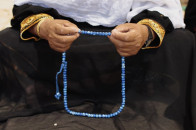Not much to write home about Qatari letters
Court says they don’t merit lengthy cross-examination; gets six weeks to conclude trial

PHOTO COURTESY: WORLD ECONOMIC FORUM
“The bottom-line of Qatari letters is that Qatari Royal Sheikh Hamad bin Jassim bin Jaber Al-Thani and the JIT (Joint Investigation Team) only exchanged letters and nothing else happened,” said the Accountability Court Judge Arshad Malik on Monday.
The judge who was hearing Al-Azizia & Hill Metal Establishment reference – one of the three corruption cases filed by the National Accountability Bureau (NAB) against the Sharif family in line with the apex court’s July 28, 2017 verdict – also observed “there is no need of a lengthy cross examination on this aspect.”
SC grants six-week extension to conclude references against Sharif family members
He noted that cross examination of the JIT head Wajid Zia started at 11:00am and ended 2:15pm. Sharif’s counsel Khawaja Harif, however, added that a few more questions about Qatari letters were left to be asked and then he would focus on other areas related to the case.
During the cross examination, Zia while answering to one of Haris’s questions said the JIT did not convene an exclusive meeting to deliberate upon the Qatari letters, especially about sending the prince a questionnaire in advance.
In one of his letters written to the JIT, Zia said, the Qatari royal suggested that the JIT might record his testimony at his palace in Doha and a questionnaire might be sent to him in advance regarding the information they wished to get.
Zia while replying to a question said the JIT took the letter seriously but discussed it as a routine matter as the JIT members used to meet every day at the Federal Judicial Academy.
In principle, he said, the JIT members had decided not to send any questionnaire to any of the witnesses in advance. Haris, however, reminded him that despite the decision the JIT did send a questionnaire to a UK-based solicitor Jeremy Freeman in connection with trust deeds of the offshore companies, Coomber and Neilson & Nescoll.
To a question, Zia said the JIT did not annex the decision of not sending the questionnaire in advance to anyone in the entire JIT report. Admitting that NAB and the Federal Investigation Agency (FIA) used to send questionnaire to witnesses in selected cases, he said there is no prohibition on recording statement of a witness at his residence but it is not a good practice.
PML-N promises ‘surprise’ in presidential election
When the former PM was presented in the court amid tight security, an associate of Haris informed the court that matter pertaining to extension was being heard in the Supreme Court and the cross examination should be conducted once the SC decides the matter.
The court took a break and later, the court was informed that the apex court has granted six-week time to the accountability court for concluding Al-Azizia and Flagship references.
On July 6, an accountability court convicted and sentenced Sharif, his daughter Maryam and son in-law Captain (retd) Safdar in the Avenfield Apartments reference.
The Sharifs challenged the verdict and filed appeals in the Islamabad High Court (IHC) seeking suspension of the sentences. The court is expected to take up the cases after summer vacations. The accountability court will resume hearing today and Haris will continue cross examination of the witness.



















COMMENTS
Comments are moderated and generally will be posted if they are on-topic and not abusive.
For more information, please see our Comments FAQ